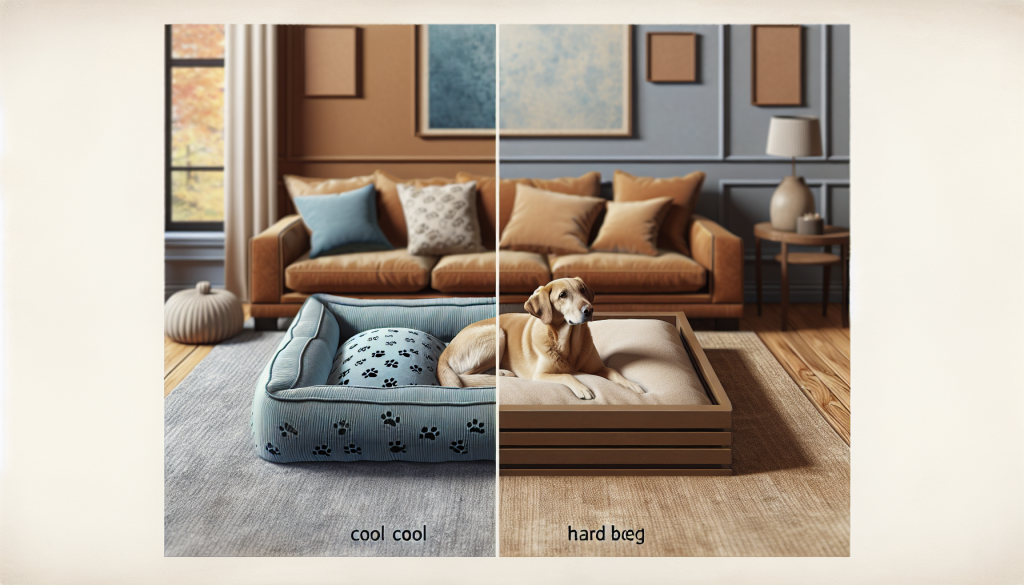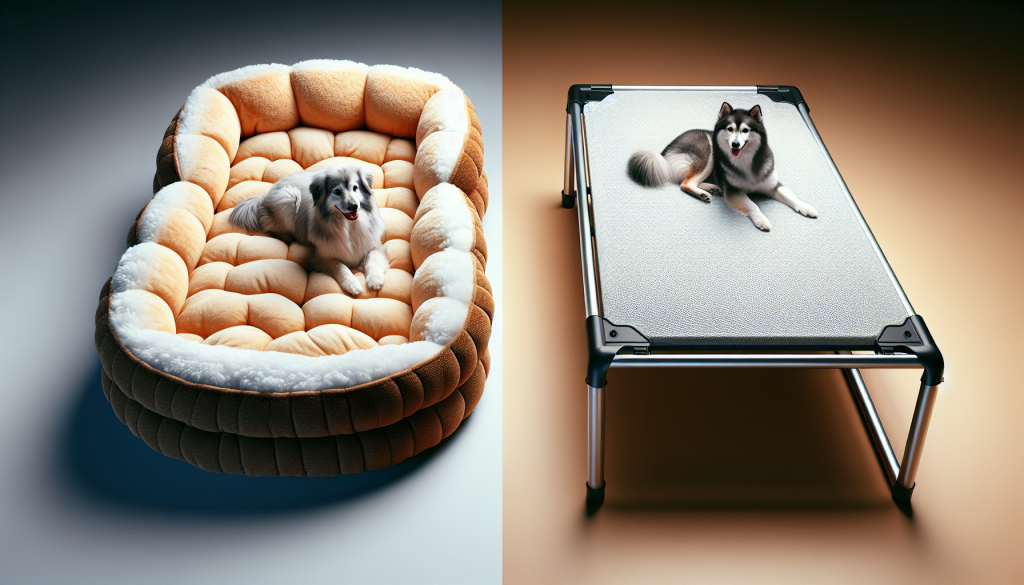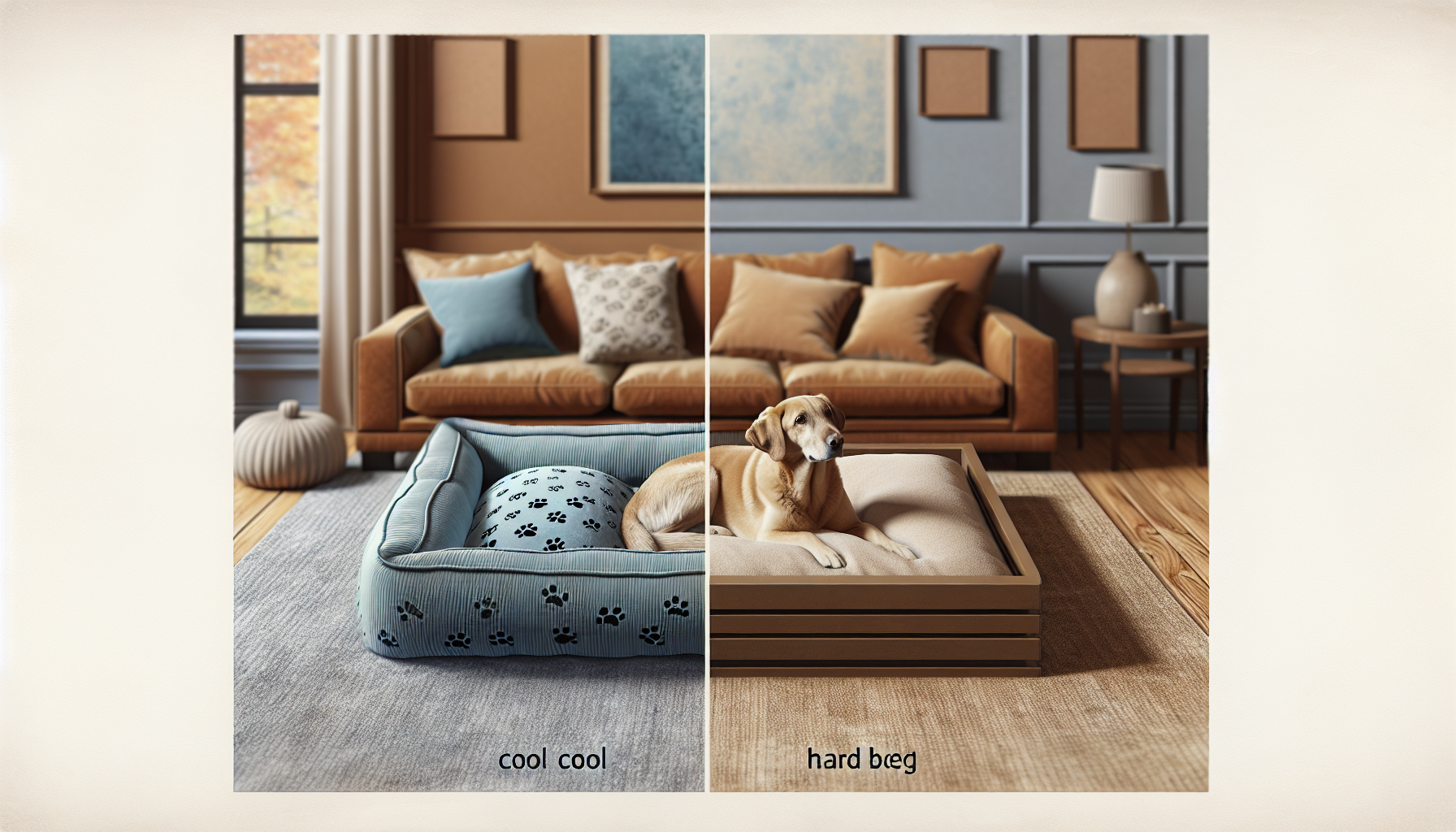Has your furry friend been having trouble getting a good night’s sleep? If so, you may be wondering whether a soft or hard bed would be better for them. In this article, we will explore the debate between soft and hard beds for dogs, weighing the pros and cons of each option. By the end, you’ll have a better understanding of which type of bed might be the ideal resting spot for your beloved canine companion.

Benefits of Soft Beds for Dogs
Comfort
Soft beds provide a high level of comfort for dogs, allowing them to rest and sleep in a cozy and cushioned environment. The softness of the bed helps to alleviate any discomfort or pressure on their body, allowing them to relax and fully unwind. Whether it’s after a long day of playing or simply for a quick nap, a soft bed offers the ultimate comfort for your furry friend.
Joint Support
Soft beds are particularly beneficial for dogs with joint issues or arthritis. The plushness of the bed helps to provide support for their joints, relieving any pain or stiffness they might experience. The soft surface contours to their body, reducing any pressure on their joints and allowing them to find a comfortable position that alleviates any discomfort. This makes a soft bed an excellent choice for older dogs or those with orthopedic conditions.
Relief from Pressure Points
Soft beds are designed to distribute your dog’s weight evenly, reducing the impact on their pressure points. This is especially important for dogs that tend to spend long periods lying down or have bony prominences that can be susceptible to pressure sores. The soft padding in the bed helps to prevent the development of these pressure points and ensures your dog remains comfortable and free from any potential discomfort.
Warmth and Insulation
Soft beds offer an additional layer of warmth and insulation for dogs, especially during colder months or in cooler climates. The plush materials used in soft beds help to retain your dog’s body heat, keeping them warm and cozy throughout their sleep. This is particularly beneficial for smaller or short-haired breeds that may be more sensitive to temperature changes. Providing a soft bed ensures that your dog can stay comfortable and maintain a healthy body temperature.
Drawbacks of Soft Beds for Dogs
Lack of Firm Support for Orthopedic Issues
While soft beds provide comfort and cushioning, they may not offer the necessary firm support for dogs with severe orthopedic issues. Dogs with conditions like hip dysplasia or spinal problems require more structured support to maintain proper alignment and alleviate their symptoms. In these cases, a specialized orthopedic bed with firmer surfaces may be more suitable.
Difficulty in Cleaning
One drawback of soft beds is that they can be more challenging to clean compared to their firmer counterparts. The plush materials used in soft beds can trap dirt, hair, and other debris, making it harder to keep the bed clean. Regular vacuuming and spot cleaning may be necessary, and some soft beds may also require occasional machine washing. It’s essential to consider the maintenance requirements of a soft bed and choose one that is easy to clean based on your dog’s habits and lifestyle.
Odor Retention
Due to the nature of the materials used in soft beds, they can be more prone to odor retention. Pet dander, sweat, and other bodily fluids can become trapped in the fibers of the bed, leading to unpleasant smells over time. Regular cleaning and airing out the bed can help minimize odors. Additionally, selecting a soft bed with odor-resistant materials or a removable, washable cover can help combat this issue.
Potential Allergens
If your dog has allergies or sensitivities, a soft bed may not be the best choice. The fabrics and materials used in soft beds can harbor allergens such as dust mites, pet dander, or pollen, potentially triggering allergic reactions in sensitive dogs. Investing in a hypoallergenic bed or using allergen-proof covers can help minimize allergen exposure and ensure a healthier resting environment for your furry companion.
Benefits of Firm Beds for Dogs
Proper Spinal Alignment
Firm beds offer excellent support for dogs, ensuring proper spinal alignment while they sleep or rest. The firm surface helps to distribute your dog’s weight evenly, preventing their body from sinking or sagging into the bed. This alignment is crucial for maintaining a healthy posture, especially for breeds prone to spinal issues or dogs recovering from spinal surgeries.
Suitable for Dogs with Orthopedic Issues
Firm beds are particularly beneficial for dogs with orthopedic issues, such as hip dysplasia or degenerative joint disease. These conditions require more support to alleviate pain and discomfort. The firmness of the bed provides the necessary stability for their joints and promotes proper weight distribution, reducing pressure on sensitive areas. A firm bed can help improve their overall comfort and quality of life.
Ease of Cleaning
One of the significant advantages of firm beds is that they are generally easier to clean compared to soft beds. The flat, smooth surfaces of the bed allow for quick and straightforward cleaning, making it convenient for busy dog owners. Many firm beds come with removable covers that can be easily washed, ensuring a clean and hygienic resting place for your canine companion.
Reduced Odor and Allergy Risk
Firm beds are less likely to retain odors or harbor allergens compared to soft beds. With fewer crevices and fibers for dirt and allergens to cling to, cleaning and maintaining a firm bed becomes more manageable. This is especially important for dogs with allergies or sensitivities, as a clean and allergen-free bed can provide them with a more comfortable and healthier sleeping environment.
Drawbacks of Firm Beds for Dogs
Lack of Cushioning
The major drawback of firm beds is the lack of cushioning and plushness that soft beds offer. Some dogs may find the firm surface less comfortable and may prefer the extra cushioning provided by a soft bed. This is especially true for dogs with sore or achy joints, who may benefit from the added support and pressure relief of a softer surface.
Potential Discomfort for Dogs with Sore Joints
For dogs with arthritis or other joint issues, a firm bed may not provide enough comfort or relief. The harder surface can create additional pressure on their joints, potentially exacerbating their pain and discomfort. It’s essential to consider your dog’s specific needs and consult with your veterinarian to determine the best type of bed for dogs with sore joints or orthopedic issues.
Inadequate Warmth and Insulation
Firm beds often lack the warmth and insulation that soft beds provide. If you live in a colder climate or your dog tends to get chilly easily, a firm bed may not offer the necessary warmth to keep them comfortable. Consider using additional blankets or bedding to provide extra insulation if you choose a firm bed for your furry friend.

Factors to Consider When Choosing a Bed for Your Dog
Size and Weight of Your Dog
The size and weight of your dog are important factors to consider when choosing a bed. Ensure that the bed you select is large enough to accommodate your dog comfortably while still providing the necessary support. Consider the weight capacity of the bed to ensure durability and longevity.
Age and Health Conditions
The age and health conditions of your dog should also inform your bed selection. Puppies may benefit from softer beds to support their developing bodies, while older dogs or those with arthritis may require the additional support and comfort of orthopedic or firm beds.
Sleeping Position and Preferences
Observe your dog’s sleeping position and preferences to find a bed that suits their needs. Some dogs prefer to stretch out, while others curl up in a ball. Choose a bed that accommodates their sleeping style and offers enough space.
Indoor vs. Outdoor Use
Consider whether the bed will be primarily used indoors or outdoors. Outdoor beds should be made from durable, weather-resistant materials that can withstand the elements. Indoor beds can focus more on comfort and aesthetics, but should still be easy to clean.
Ease of Cleaning and Maintenance
Evaluate the cleaning and maintenance requirements of a bed before making a purchase. Look for beds with removable, machine-washable covers or beds that can be easily wiped clean. This ensures that your dog’s bed stays fresh and hygienic.
The Importance of Orthopedic Beds for Dogs with Joint Issues
Understanding Joint Conditions in Dogs
It’s crucial to have a basic understanding of joint conditions that commonly affect dogs. Conditions such as arthritis, hip dysplasia, and elbow dysplasia can cause pain, stiffness, and reduced mobility. Providing proper support and comfort through an orthopedic bed can significantly improve their quality of life.
The Benefits of Orthopedic Beds for Joint Support
Orthopedic beds are specifically designed to provide optimal support and comfort for dogs with joint issues. These beds typically feature high-density foam or memory foam that molds to the shape of your dog’s body. This helps relieve pressure on their joints, ensuring proper alignment and reducing pain and inflammation.
Materials and Features to Look for in Orthopedic Beds
When choosing an orthopedic bed, look for beds made from high-quality memory foam or orthopedic foam. This ensures a supportive and long-lasting bed for your dog. Consider features like removable and washable covers for easy cleaning, as well as non-slip bottoms to keep the bed in place.
Finding the Right Balance: Hybrid Beds for Dogs
Combining Softness and Firmness
Hybrid beds offer the best of both worlds by combining softness and firmness. These beds often feature a layer of cozy memory foam or orthopedic foam on top of a firmer base. This unique combination provides the perfect balance between cushioning and support.
Benefits of Hybrid Beds for Dogs
Hybrid beds are ideal for dogs who need both comfort and additional support. The soft top layer offers plushness and pressure relief, while the firmer base provides stability and proper alignment. Hybrid beds are especially beneficial for dogs with mild to moderate joint issues who require a mix of cushioning and support.
Factors to Consider when Choosing a Hybrid Bed
Consider the quality of the materials used in the hybrid bed, as well as the specific needs of your dog. Look for beds with high-density foams that offer durability and long-lasting support. Additionally, make sure the bed is the right size and provides adequate weight capacity for your dog.
How to Determine the Right Bed for Your Dog
Observing Your Dog’s Sleeping Habits
Take the time to observe your dog’s sleeping habits and preferences. Pay attention to how they lie down, the positions they prefer, and any signs of discomfort or difficulty getting comfortable. This will give you important insights into the type of bed that would best suit their needs.
Experimenting with Different Beds
If you’re unsure which type of bed is best for your dog, consider experimenting with different options. Start with a soft bed and observe your dog’s response. If they show signs of discomfort or it doesn’t meet their needs, try a firmer bed or an orthopedic bed. This trial and error process can help you find the perfect fit for your furry friend.
Consulting with Your Veterinarian
When in doubt, consult with your veterinarian. They have a deep understanding of your dog’s specific needs and can provide valuable guidance on the type of bed that would be most beneficial. They may also recommend specialized orthopedic beds or other supportive devices if necessary.
Conclusion
Choosing the right bed for your dog is essential for their comfort, support, and overall well-being. Soft beds offer superior comfort, joint support, pressure point relief, and warmth, making them ideal for most dogs. However, firm beds provide proper spinal alignment, ease of cleaning, reduced odor, and are suitable for dogs with specific orthopedic conditions. Factors such as size, age, and health conditions should be considered when selecting a bed, along with your dog’s sleeping position and preferences. For dogs with joint issues, orthopedic beds offer the necessary support and relief. Hybrid beds combine softness and firmness, providing a balance between comfort and support. By carefully considering these factors and observing your dog’s needs, you can find the perfect bed to ensure that your canine companion enjoys restful and rejuvenating sleep.
